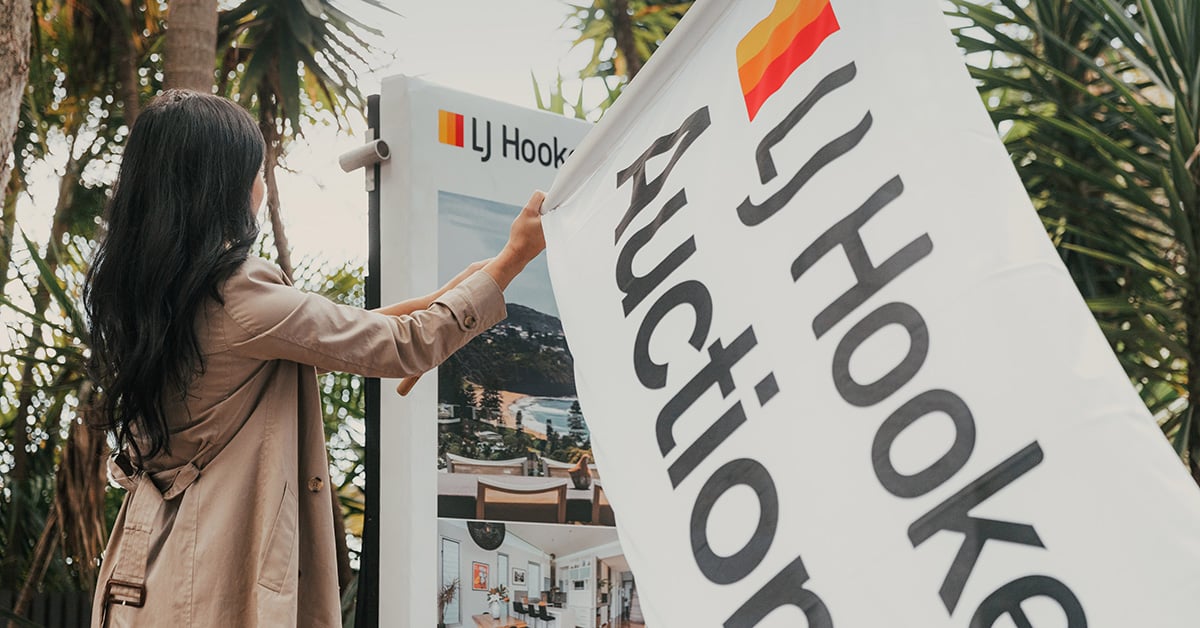Selling by Auction: What to Expect on the Day

Even if you’ve never been to a property auction in person, you’ll have a good idea - thanks to TV - of all the drama and excitement around such a sale. Nervous bidders making offers, the anxious seller and the auctioneer holding up the gavel at the end yelling, ‘Going once, going twice – and it’s sold!’.
But is it like in real life? What is the process for selling at auction and will this be the best method of sale for your home?
Before you decide, it is important to understand the property auction process leading up to and including the big day. Let’s look at all the steps for selling your home under the hammer.
Before auction day
You’ve had your property appraised and have chosen your listing agent. If you live in a suburb where auctions are popular or you are looking to relocate quickly, your agent may suggest this method of sale.
There is not a huge difference in how a home will be marketed if sold via private treaty or auction. Your property will still need to be properly prepared with decluttering and styling. Remember, knowing how to stage your home to sell is essential to win over prospective buyers. Your property will also be photographed and promoted through real estate portals and social media with open inspections held in the lead-up to auction day.
Unlike a private treaty sale, auction marketing campaigns have a deadline. It typically runs for three to four weeks with a date and time set for the sale. One of the benefits of an auction is that the campaign focuses on reaching the most amount of people in a short amount of time. Another advantage is that it is considered a transparent sales method. It happens in real time and the result reflects the true market value.
During the marketing campaign, agents will gather what is known as ‘buyer feedback’ which best indicates the price they will most parties would be happy to pay. This is instrumental in setting what is called the ‘reserve price’ – this is the minimum price you will be happy to accept on auction day. This reserve price is not publicly disclosed.
The auctioneer is allowed to make a bid on behalf of the vendor. If this is something you would like to do, you must inform your agent beforehand.
Auction day preparation
If your auction is being held on-site, this is your last opportunity to impress prospective buyers. They will want one final look around before bidding, so your home must be spotless and well-presented.
Make sure all beds are made, add a bunch of fresh flowers in a vase and sweep away any fallen leaves outside. Find a baby or pet-sitter for the day, so you can focus on the task at hand. You find more tips on how to best prepare your home here.
Your agent needs to display documentation of the property at least 30 minutes before the auction. It is a requirement by law to have this information easily viewable for all interested parties.
In most states, all interested buyers are required to register before the auction commences to receive a bidder’s number. This list is confidential, and you will not be able to see it even after the auction.
The auctioneer's job and rules of auction
Essentially the auctioneer’s responsibility is to control a public negotiation process where potential buyers are competing to buy a property.
The auctioneer has to make sure everything takes place in an orderly and legal manner and while there is often an element of showmanship in the role, with humorous asides and jokes, the auctioneer must always conduct him or herself professionally.
Before proceedings commence they will need to announce the auction terms and conditions by state law and any rules that surround your auction in particular.
They will encourage bidders to go higher but at the end of the day, each bidder decides how much they are prepared to pay and the seller decides whether they’re prepared to sell at that price.
All bids must be acknowledged and recorded, often by assistants so there are no misunderstandings over who has bought the property and for how much. And no bids can be accepted after the hammer falls or by an unregistered bidder.
A good auctioneer can read body language and create an atmosphere of fun and entertainment to take the pressure off a very serious process.
They know how to prevent disputes and how to handle any problems that can occasionally occur.
Legislation differs in all states and territories about buying at auction so if you have any queries check with your agent and/or legal professional.
Opening bids and bidding
At the start of the proceedings, the auctioneer will run through the property up for sale, detail the features and provide an overview of what is included as part of the sale.
They will then invite the audience to make an opening bid. Don’t stress if the room is silent, it is not unusual for even the keenest of buyers to hold back, initially. And if no one makes an offer, your auctioneer may use your vendor’s bid to kick-start proceedings.
Once the auction is going, interested buyers will then bid on the property in increments until it reaches its reserve price. At this point, the auctioneer will declare that the home is ‘on the market’ and the property will be sold unconditionally.
Let’s take a look at all of this a little more closely.
Vendor's Bids
If offers stall, the auctioneer or another legally permitted person may also use the vendor’s bid to encourage offers closer to the reserve price. As mentioned earlier, if this is a strategy you’d like to use, it needs to be declared before the auction begins.
Dummy Bids
A dummy bid on the other hand is a false bid made by a non-genuine buyer. All dummy bids are illegal and attract significant penalties for the vendor (up to $20,000 in SA and up to $55,000 in NSW), the dummy bidder and in some cases the agent if it can be proved they solicited the bid.
Rises and Advances
This is the amount by which bids increase during an auction and is usually dictated by the auctioneer. They could be $500 or $5000, and do not necessarily have to be adhered to - but the auctioneer can reject your bid if they think you have not advanced the bidding by enough.
Reserve price
The reserve price is effectively the point at which the auction becomes “live”. This is an exciting moment in any auction as bidders know they are in real contention to purchase the property. The winning bid is legally binding, so buyers mustn’t overextend their budget or get carried away in the heat of the moment.
If bidding does not reach the reserve price under the hammer, then a negotiation by the highest bidder and seller may take place. This may continue for hours or days but usually, a contract on the property is executed reasonably soon after the auction itself.
On the Market and Passed In
During the auction, the auctioneer may stop the proceedings and say they are seeking advice or instruction from the vendor. This gives the auctioneer time to discuss the progress of bidding with you, the seller.
If the bidding has reached the reserve price or is close, the auctioneer will ask you if you are willing to adjust your reserve and sell the property for the highest price. If you are, the auctioneer will announce to the crowd that the property is on the market or in other words, that it will be sold to the highest bidder.
If the bidding does not reach the reserve price or you are unwilling to lower your expectations, the property may be passed in. In this case, the highest bidder may be given the first opportunity to negotiate a sale, however, this is not legislation in most states.
Pre-Auction offers
When you list your property for sale by auction, you still can accept pre-auction offers before the auction day deadline. All pre-auction offers need to be submitted in writing to your agent who in turn will present it to you for consideration.
However, for this to be rewarding, the offer needs to be solid and stand out to catch your attention. If there is a high level of interest in the property throughout the campaign and bidding looks likely to hit your target price, then your real estate agent may advise going to auction and see what the market will pay.
What every seller should do on auction day
On-site auctions require preparation by the seller as there are likely to be a lot of people in your home for one last inspection, so be sure your home is still looking its best. You may pick up a buyer at the last minute and you certainly don’t want to deter buyers that are there to bid.
Inform your neighbours of the auction day and time, ask that they do you a favour and keep noise to a minimum or go one further and invite them to the auction.
Set up a suitable area to hold the auction. Usually, it is held in the garden or on the front footpath, however, your agent and auctioneer will be able to guide you. Make sure you agree with your agent whether they want you to be present at the auction or to hide away.
You may want to be close by but not visible to potential buyers. It can be a good idea to wait inside, so you can hear the proceedings or be updated by your agent.
The auctioneer and/or agent may feel you shouldn't be present at the auction, as in your excitement you may telegraph your position to buyers and therefore affect further bids.
Selling property at auction - some extra things to consider
When you sell at auction there is normally no cooling-off period - the contracts are signed and the deposit is paid on the day.
A 10% deposit is normally paid by the buyer/s with the balance due on the agreed settlement date.
The deposit is held on your behalf in the agency’s trust account for an investment account.
Before settlement, the property remains your responsibility, so it is important to ensure you maintain your home insurance during this period.
Once the contract is signed the process of transfer can begin. You may use the services of a solicitor or conveyancing company to handle the transfer on your behalf.
As part of the transfer process, arrangements will be made for the balance of the purchase price to be paid as directed by you to your bank account, or any party or account you nominate.
Settlement Day is the date when the balance of monies owning less costs are paid, keys are handed over and the property then becomes the responsibility of the purchaser.
Seek help from the experts
Your local LJ Hooker agent will be invaluable when it comes to organising and managing your auction.
They are there to reassure you and answer any questions throughout the auction process to assist in achieving your goal price.
DISCLAIMER - The information provided is for guidance and informational purposes only and does not replace independent business, legal and financial advice which we strongly recommend. Whilst the information is considered true and correct at the date of publication, changes in circumstances after the time of publication may impact the accuracy of the information provided. LJ Hooker will not accept responsibility or liability for any reliance on the blog information, including but not limited to, the accuracy, currency or completeness of any information or links.
Book a free property appraisal with your local real estate agent
Get an idea of how much your home is worth, and get help from experts in the industry with over 90 years of experience.



.jpg)